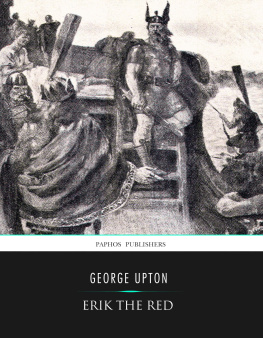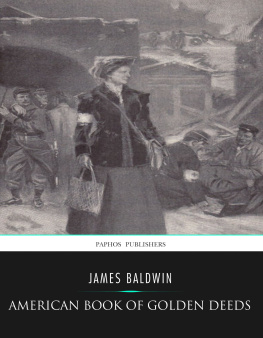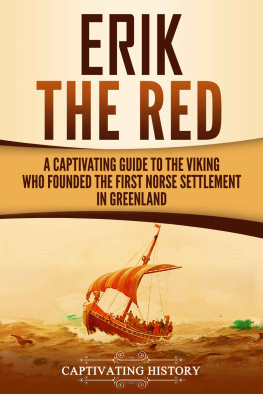George Upton - Erik the Red
Here you can read online George Upton - Erik the Red full text of the book (entire story) in english for free. Download pdf and epub, get meaning, cover and reviews about this ebook. year: 2018, publisher: Charles River Editors, genre: Detective and thriller. Description of the work, (preface) as well as reviews are available. Best literature library LitArk.com created for fans of good reading and offers a wide selection of genres:
Romance novel
Science fiction
Adventure
Detective
Science
History
Home and family
Prose
Art
Politics
Computer
Non-fiction
Religion
Business
Children
Humor
Choose a favorite category and find really read worthwhile books. Enjoy immersion in the world of imagination, feel the emotions of the characters or learn something new for yourself, make an fascinating discovery.
- Book:Erik the Red
- Author:
- Publisher:Charles River Editors
- Genre:
- Year:2018
- Rating:5 / 5
- Favourites:Add to favourites
- Your mark:
- 100
- 1
- 2
- 3
- 4
- 5
Erik the Red: summary, description and annotation
We offer to read an annotation, description, summary or preface (depends on what the author of the book "Erik the Red" wrote himself). If you haven't found the necessary information about the book — write in the comments, we will try to find it.
Paphos Publishers offers a wide catalog of rare classic titles, published for a new generation.
Erik the Red is a short biography of the famous Viking.
Erik the Red — read online for free the complete book (whole text) full work
Below is the text of the book, divided by pages. System saving the place of the last page read, allows you to conveniently read the book "Erik the Red" online for free, without having to search again every time where you left off. Put a bookmark, and you can go to the page where you finished reading at any time.
Font size:
Interval:
Bookmark:
Erik the Red
By George Upton
IN THE FIRST HALF OF the tenth century, Thorwald, son of Oswald, with his son Erik the Red, fled from Jadar, in the western part of Rogaland in Norway, to Iceland, because of a murder the latter had committed, and settled at Dranga in the northwestern part of that country.
After the death of Thorwald, Erik married Thorbild, daughter of Jorund, left Dranga and settled at a place afterward named for him, Erikstad. On account of another murder he committed in Iceland he was forced to leave Erikstad and went westward to Oexnaga. He was finally declared guilty by the court at Thorsmes and a sentence of banishment for three years was issued.
Thereupon, in the Spring of 982 he set sail westward, accompanied by Styr, son of Thorgrim, with his people, toward a land which had been seen by Gunnbiorn, son of Ulv Kraka, when driven to the western ocean by a storm. Upon Gunnbiorns return he urged his friends to go to this new land which he had found. Erik at this time was forty-seven years old. He reached the new country, Greenland, in Summer and spent the first Winter at Eriksaya, in the middle of the east coast. In the following Spring he went inland and settled at Eriksfjord. In the Summer of 983 he made an expedition to the west coast and named several places. The second Winter (983-984) he spent upon an island near Hafusquip, and in the third Summer returned to Iceland, landing at Breidafjord. As Pliny the Elder, and after him Bede the Venerable, had already named the sea surrounding Thule or Iceland the Mare Cronicum, Gunnbiorn, when he saw the new land, called it Cronland. Erik named it Grunland (Greenland) on account of the green meadows he found there, and, as he stated, because people would be induced to go there on account of the inviting name.
During his stay in Iceland (984-985) Erik must have been very actively engaged in circulating glowing descriptions of his new green home, for in the Summer of 985 the number of those who decided to go to Greenland was so great that the emigrants with their animals and domestic effects filled twenty-five vessels, which sailed from the two bays of Breidafjord and Borgafjord. They took with them horses, cows, and oxen, animals which do not exist in Greenland in our times. But of all these vessels only fourteen were fortunate enough to reach Greenland from the west coast of Iceland, a distance of not over two hundred English leagues. We have no further intelligence of the fate of the remaining vessels.
Arrived at their destination, Erik fixed his settlement at Brattalid on the Eriksfjord. After the rest of the colonists had established themselves, Erik was elected their protector and judge, and as the Chronicles affirm, managed their affairs very wisely. Some of the heads of families settled on the west coast of Greenland,Ketil at Ketilsfjord; Rafn at Rafnsfjord; Solvius at Solvadal; Helgius, son of Thorbrand, at Alptafjord; Thorbjorn Glora at Siglafjord; Einar at Einarsfjord; Haugrim at Haugrimsfjord and Vatuahverf; Arnloeg at Arnloegsfjord; and Hjerulf at Hjerulfsfjord, which he named Hjerulfness.
Among the new colonists, the last named, Hjerulf, is a personality not to be overlooked. He came of a noble family in Iceland which owned valuable properties and exercised great power. By his wife Thorgerde he had a son named Biorn, or Bjarni, an account of whom will be found in the next chapter. In their new Greenland home, Hjerulf of Hjerulfness, next to Erik the Red, was the richest and most important man. Eriks daughter Freydisa married Thorward, who lived at Gardar, the subsequent seat of the East.
AN OVERPOWERING PASSION FOR EXPLORATION and the longing to know of foreign men and countries by personal acquaintance, characterized Biorn, the young and strenuous son of Hjerulf. On his cold island he found nothing that his heart longed for. In the circle of his friends and relatives and in his commonplace everyday life there was nothing that could satisfy the young Northern hero. Fame and riches were a magnet drawing him away from the home place with irresistible force. Favored by various circumstances, he at last came into possession of a trading vessel with which he made trips during the favorable season of the year, remaining at his fathers house during the winter season.
Upon returning from a voyage to Norway, he found that Erik had been banished from Iceland for three years, as related in the last chapter, and that Hjerulf, his own father, had followed him to that country. His decision was not long delayed. His disappointment at not meeting his father was bitter, but our Northern hero was made of stout stuff. He did not unload his vessel, which lay at anchor in the Bay of Eyrar, and replied to his crew when they asked what he proposed to do that he was going to spend that Winter with his father in Greenland. I will steer my course to Greenland, he said to them, if you will go with me. All assented, although Biorn did not conceal from his crew the difficulties and dangers of the undertaking. Our voyage, he said, will be regarded as foolhardy, as none of us has been on the Greenland Sea before. But well pleased, they weighed anchor and set forth courageously upon the high seas.
On board Biorns vessel was a Christian, a monk from a monastery in the Hebrides Islands. To him we are indebted for saving the song of Biorn, appealing for divine protection, which was sung on board, the last verse of which runs:
To the Tryer of holy men,
To the Knower of danger,
I pray He favor my voyage.
May the Lord,
Who holds heaven and earth,
Protect me with His power.
This simple, heartfelt song, written and sung upon the vessel reeling among the fearful billows of the Arctic Ocean may have been heard many a time sounding across the waves, especially when Christian missionaries were sailing to this unknown, strange land, surrounded by the majestic but terrible waste of waters.
The terror of the sea, however, did not abate. After the bold Icelandic seafarers left their coast a north wind sprang up. Shortly thereafter they were enveloped in a dense fog for several days and completely lost their course. When the weather cleared up, they sailed on for a day and a night and at last saw a land without mountains, which had rising ground and was covered with woods. They were convinced this could not be their destination and put out to sea again. It is supposed that the two lands which Biorn approached were Newfoundland and Nova Scotia, which Leif the Lucky, son of Erik the Red, subsequently discovered. He was much censured in Norway and in Iceland because he did not explore the new lands he saw.
After two days sailing they beheld another land which was low and wooded. Again they sought the open sea, and a favoring southwest wind filled the sails and after three days the third land came in sight which was high, mountainous, and ice-clad. After cruising along the coast, Biorn was convinced it was an island. As it was not very inviting, however, he did not land but steered further on in the same direction with favoring winds. At last his courage and faith were rewarded. After four days they reached the promontory of Hjerulfness in Greenland. In the bay they found a boat and not far away Hjerulfs house. Biorn was with his father once more and did not leave him until his death. After Hjerulf passed away, Biorn came into possession of his estate. He made a voyage to Norway, probably in 994, when he told Earl Erik, one of the Norwegian jars or princes, of his travels and experiences, though he must often have reproached himself because he had not sufficiently made himself acquainted with the new country.
Font size:
Interval:
Bookmark:
Similar books «Erik the Red»
Look at similar books to Erik the Red. We have selected literature similar in name and meaning in the hope of providing readers with more options to find new, interesting, not yet read works.
Discussion, reviews of the book Erik the Red and just readers' own opinions. Leave your comments, write what you think about the work, its meaning or the main characters. Specify what exactly you liked and what you didn't like, and why you think so.













